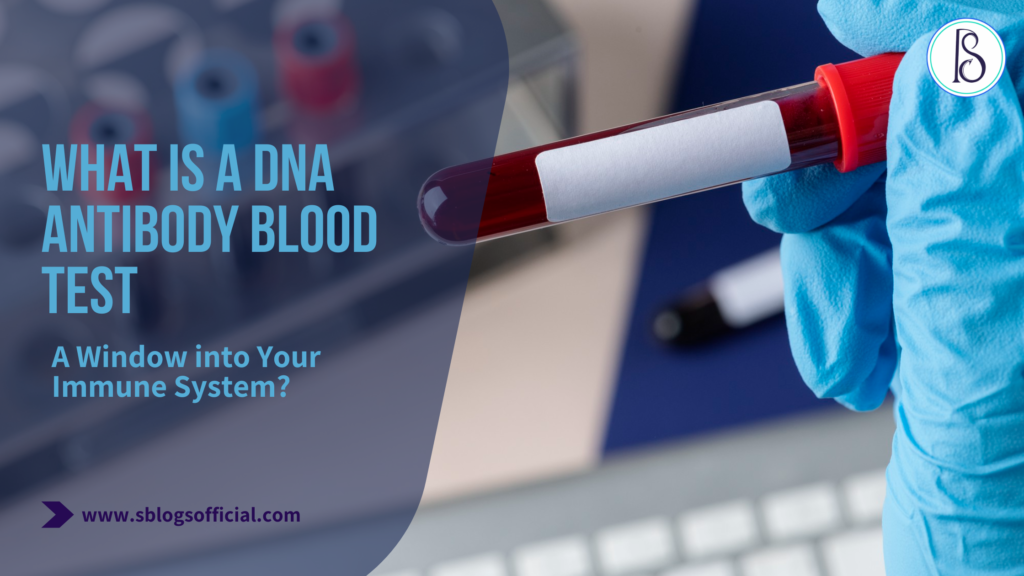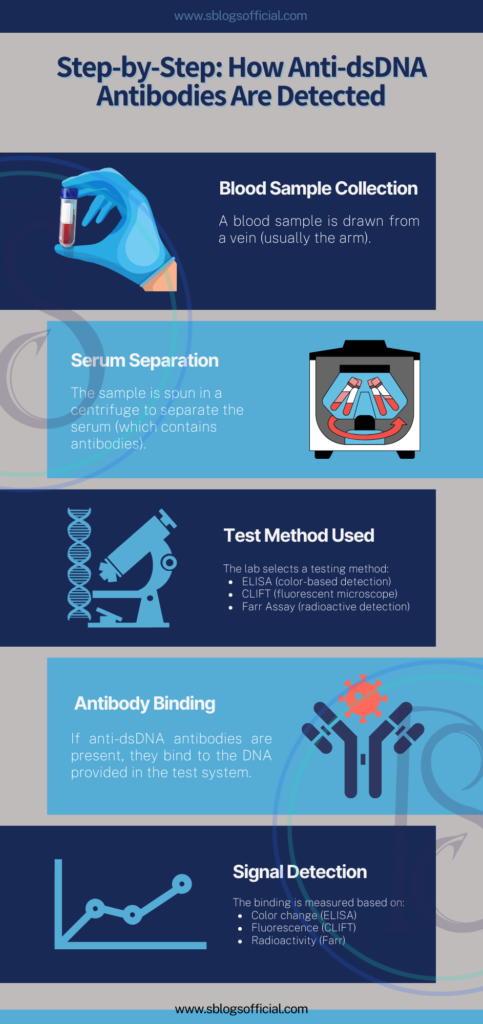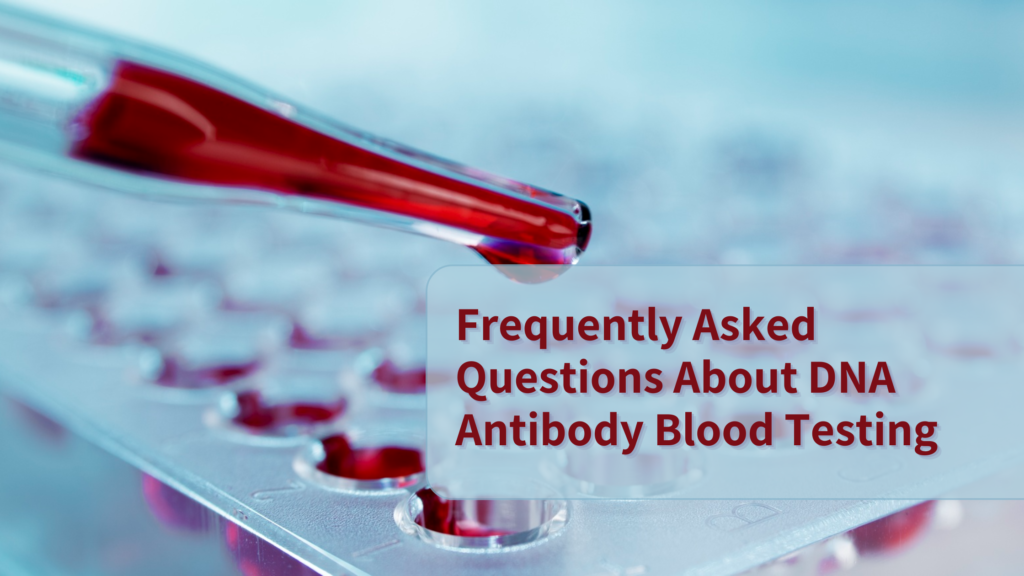
What is a DNA antibody blood test? This specialised diagnostic tool, also known as the anti-dsDNA (anti-double-stranded DNA) test, is a crucial blood examination that detects antibodies your immune system produces against your own DNA. When your body’s defence mechanism mistakenly identifies your DNA as a foreign invader, this test reveals that autoimmune response.
Your immune system works tirelessly to protect you from germs, bacteria, viruses, and parasites. However, sometimes this protective mechanism goes awry and turns against your own body. Understanding what is a DNA antibody blood test becomes essential when doctors suspect autoimmune conditions, particularly systemic lupus erythematosus (SLE).
Why You Need to Know What Is a DNA Antibody Blood Test
What is a DNA antibody blood test used for? This test serves as the most essential laboratory examination for diagnosing systemic lupus erythematosus (SLE), a systemic autoimmune disorder affecting multiple organs and tissues. The test specifically detects anti-double-stranded DNA antibodies, which are highly specific markers for SLE and autoimmune hepatitis.
Who Should Consider DNA Antibody Blood Testing
Individuals experiencing symptoms such as:
- Persistent joint pain and swelling
- Unexplained fatigue and weakness
- Characteristic skin rashes (butterfly rash across cheeks)
- Kidney problems or dysfunction
- Recurring fever without clear cause
These symptoms may indicate the need for understanding the blood test and potentially undergoing this examination.
Also Read- Genetic Methylation Testing: Unlocking Your Body’s Cellular Programming Secrets
The Science Behind What Is a DNA Antibody Blood Test: How DNA Antibody Detection Works
When considering what is a DNA antibody blood test, it’s important to understand the testing process. Healthcare professionals collect a blood sample from your vein, which is then analysed in specialised laboratories using advanced methods, including:
- ELISA (Enzyme-Linked Immunosorbent Assay)
- CIA (Chemiluminescent Immunoassay)
- FEIA (Fluoroenzyme Immunoassay)
- Farr Radioimmunoassay
- CLIFT (Crithidia luciliae Indirect Immunofluorescence Test)
Among these methods, ELISA and CIA are preferred for clinical monitoring due to their accuracy and reliability in answering DNA antibody blood test results.

Understanding Your Test Results
Normal DNA Antibody Levels:
- Typical range: 0-25 IU/ml
- Considered negative or non-reactive
- Indicates no active autoimmune response
Elevated DNA Antibody Levels:
- Above 25 IU/ml
- May indicate active autoimmune response
- Often correlates with lupus disease activity
- Higher levels suggest more active disease
What Is a DNA Antibody Blood Test? Cost and Accessibility
Understanding what a DNA antibody blood test costs helps patients plan for this important diagnostic procedure. In India, the anti-dsDNA test typically costs between ₹800 to ₹2,500, depending on:
- Laboratory location and facilities
- Geographic region
- Additional services included
- Insurance coverage availability
Making DNA Antibody Testing Affordable
Before scheduling your test, consult with your healthcare provider about:
- Insurance coverage options
- Laboratory comparison pricing
- Package deals with other autoimmune tests
- Payment plan availability
Clinical Significance of What Is a DNA Antibody Blood Test: Diagnostic Applications
What is a DNA antibody blood test’s role in medical diagnosis? This test serves multiple clinical purposes:
- Primary SLE Diagnosis: Highly specific marker for systemic lupus erythematosus
- Disease Activity Monitoring: Levels fluctuate with lupus flare-ups
- Treatment Response Evaluation: Helps assess therapy effectiveness
- Kidney Involvement Detection: Elevated levels often indicate renal complications
Limitations and Considerations
While understanding what a DNA antibody blood test is crucial, it’s important to know that:
- Positive results require clinical correlation
- Various factors can affect test accuracy
- Recent vaccinations may influence results
- Pregnancy can impact antibody levels
- Other autoimmune conditions may cause elevation
Also Read- Elderly Care Robots: How They Are Changing the Way of Care Giving
Frequently Asked Questions About DNA Antibody Blood Testing

DNA antibody blood test is a specialised laboratory examination that detects antibodies your immune system produces against your own double-stranded DNA. This test, also called the anti-dsDNA test, identifies when your body’s defence mechanism mistakenly targets your genetic material as a foreign substance. The test is primarily used to diagnose and monitor systemic lupus erythematosus (SLE), an autoimmune condition where the immune system attacks healthy tissues and organs throughout the body.
What does a positive DNA antibody test mean?
A positive result indicates that your immune system is producing antibodies that target your own DNA, suggesting active autoimmune activity. This finding is highly specific for systemic lupus erythematosus (SLE), though it can occasionally appear in other autoimmune conditions like lupoid hepatitis. However, a positive test alone doesn’t confirm SLE diagnosis – doctors must combine these results with clinical symptoms, physical examination findings, and other laboratory tests for accurate diagnosis. The antibody levels often correlate with disease activity, meaning higher levels typically indicate more active lupus symptoms.
What is the DNA test for antibodies?
This refers to the anti-double-stranded DNA (anti-dsDNA) antibody test, which uses several sophisticated laboratory methods to detect these specific antibodies in your blood. The most common testing methods include:
- ELISA (Enzyme-Linked Immunosorbent Assay) – Preferred for clinical monitoring
- CIA (Chemiluminescent Immunoassay) – Highly accurate automated method
- Farr Radioimmunoassay – Gold standard but less commonly used
- CLIFT (Crithidia luciliae Indirect Immunofluorescence Test) – Visual detection method
- FEIA (Fluoroenzyme Immunoassay) – Sensitive detection technique
Healthcare professionals collect a blood sample from your vein, and the laboratory analyses it using one or more of these methods to determine the presence and concentration of anti-dsDNA antibodies.
What is the cost of a dsDNA test?
In India, the anti-dsDNA antibody test typically costs between ₹800 to ₹2,500, depending on several factors:
- Laboratory location and reputation
- Geographic region and city
- Testing methodology used
- Additional services included
- Insurance coverage availability
Private diagnostic centres in metropolitan cities tend to charge higher fees, while government hospitals and smaller labs may offer more affordable options. Many insurance plans cover this test when medically necessary for autoimmune disease diagnosis or monitoring. It’s advisable to compare prices across multiple laboratories and check with your healthcare provider about insurance coverage before scheduling the test.
What is a normal dsDNA level?
Normal anti-dsDNA antibody levels typically range from 0 to 25 IU/ml (International Units per millilitre), though reference ranges may vary slightly between different laboratories. Here’s what different levels indicate:
Normal/Negative Range (0-25 IU/ml):
- No significant autoimmune activity detected
- Considered non-reactive result
- Indicates healthy immune system function
Borderline Range (25-30 IU/ml):
- May require repeat testing
- Could indicate early autoimmune activity
- Needs clinical correlation with symptoms
Elevated/Positive Range (Above 30 IU/ml):
- Suggests active autoimmune response
- Often correlates with lupus disease activity
- Higher levels may indicate more severe symptoms
- Requires immediate medical evaluation
It’s important to note that dsDNA antibody levels can fluctuate over time, especially during lupus flare-ups or when kidney involvement occurs. Regular monitoring helps doctors track disease progression and treatment effectiveness.
Is DNA Antibody Testing Painful?
The test involves a simple blood draw, similar to routine blood work, with minimal discomfort lasting only a few seconds.
How Often Should DNA Antibody Testing Be Done?
For individuals with diagnosed lupus, regular monitoring every 3-6 months helps track disease activity and treatment response.
Can DNA Antibody Tests Give False Results?
Like all medical tests, anti-dsDNA testing can occasionally produce false positives or negatives, emphasising the importance of clinical correlation.
Also Read- Amazing Facts About DNA: The Incredible Secrets Inside You
Expert Recommendations for DNA Antibody Blood Testing
When to Consult Your Doctor
Understanding what is a DNA antibody blood test helps you recognise when to seek medical attention. Consult your healthcare provider if you experience:
- Persistent unexplained symptoms
- Family history of autoimmune diseases
- Previous positive ANA (antinuclear antibody) results
- Recurring inflammatory symptoms
Preparing for Your DNA Antibody Test
What is a DNA antibody blood test preparation requirement? Generally, no special preparation is needed, but inform your doctor about:
- Current medications
- Recent vaccinations
- Pregnancy status
- Other autoimmune conditions
The Future of DNA Antibody Blood Testing
Advancing Diagnostic Accuracy
Medical technology continues improving what is DNA antibody blood test capabilities are through:
- Enhanced testing methodologies
- Improved result interpretation
- Better correlation with clinical symptoms
- Reduced false positive rates
Personalised Medicine Applications
Understanding DNA antibody blood test contributes to personalised treatment approaches, allowing doctors to:
- Tailor therapy based on antibody levels
- Predict disease flares more accurately
- Monitor treatment response more effectively
- Adjust medications proactively
Conclusion: The Importance of Understanding What Is a DNA Antibody Blood Test
What is a DNA antibody blood test? It’s a vital diagnostic tool that provides crucial insights into autoimmune activity, particularly for systemic lupus erythematosus diagnosis and management. This specialised blood examination helps healthcare providers detect when your immune system mistakenly attacks your DNA, enabling early intervention and appropriate treatment strategies.
Regular monitoring through DNA antibody blood testing, combined with clinical evaluation and patient history, forms the foundation of effective autoimmune disease management. While the test provides valuable information, it should always be interpreted alongside other clinical findings and laboratory results for accurate diagnosis and optimal patient care.
Understanding what is a DNA antibody blood test empowers patients to make informed healthcare decisions and work collaboratively with their medical team for better health outcomes.
References
- InformedHealth.org [Internet]. Cologne, Germany: Institute for Quality and Efficiency in Health Care (IQWiG); 2006-. In brief: How does the immune system work? [Updated 2023 Jun 6].
- Cockx, M., Van Hoovels, L., De Langhe, E., Lenaerts, J., Thevissen, K., Persy, B., Bonroy, C., Vercammen, M. and Bossuyt, X., 2022. Laboratory evaluation of anti-dsDNA antibodies. Clinica Chimica Acta, 528, pp.34-43. Laboratory evaluation of anti-dsDNA antibodies – ScienceDirect
- Blatt, N.B. and Glick, G.D., 1999. Anti-DNA autoantibodies and systemic lupus erythematosus. Pharmacology & therapeutics, 83(2), pp.125-139. Review article: Anti-DNA autoantibodies and systemic lupus erythematosus
- Systemic Lupus Erythematosus Angel A. Justiz Vaillant; Amandeep Goyal; Matthew A. Varacallo.
- Chang HC, Wu YC, Chen JP, Wu YD, Huang WN, Chen YH, Chen YM. Comparisons of Anti-dsDNA Antibody Detection Methods by Chemiluminescent Immunoassay and Enzyme-Linked Immunosorbent Assay in Systemic Lupus Erythematosus. Diagnostics (Basel). 2021 Oct 20;11(11):1940. doi: 10.3390/diagnostics11111940. PMID: 34829287; PMCID: PMC8621573. 10.3390/diagnostics11111940
- Anti dsDNA Test: Get Price, Purpose, Results & Sample Report [2025]
